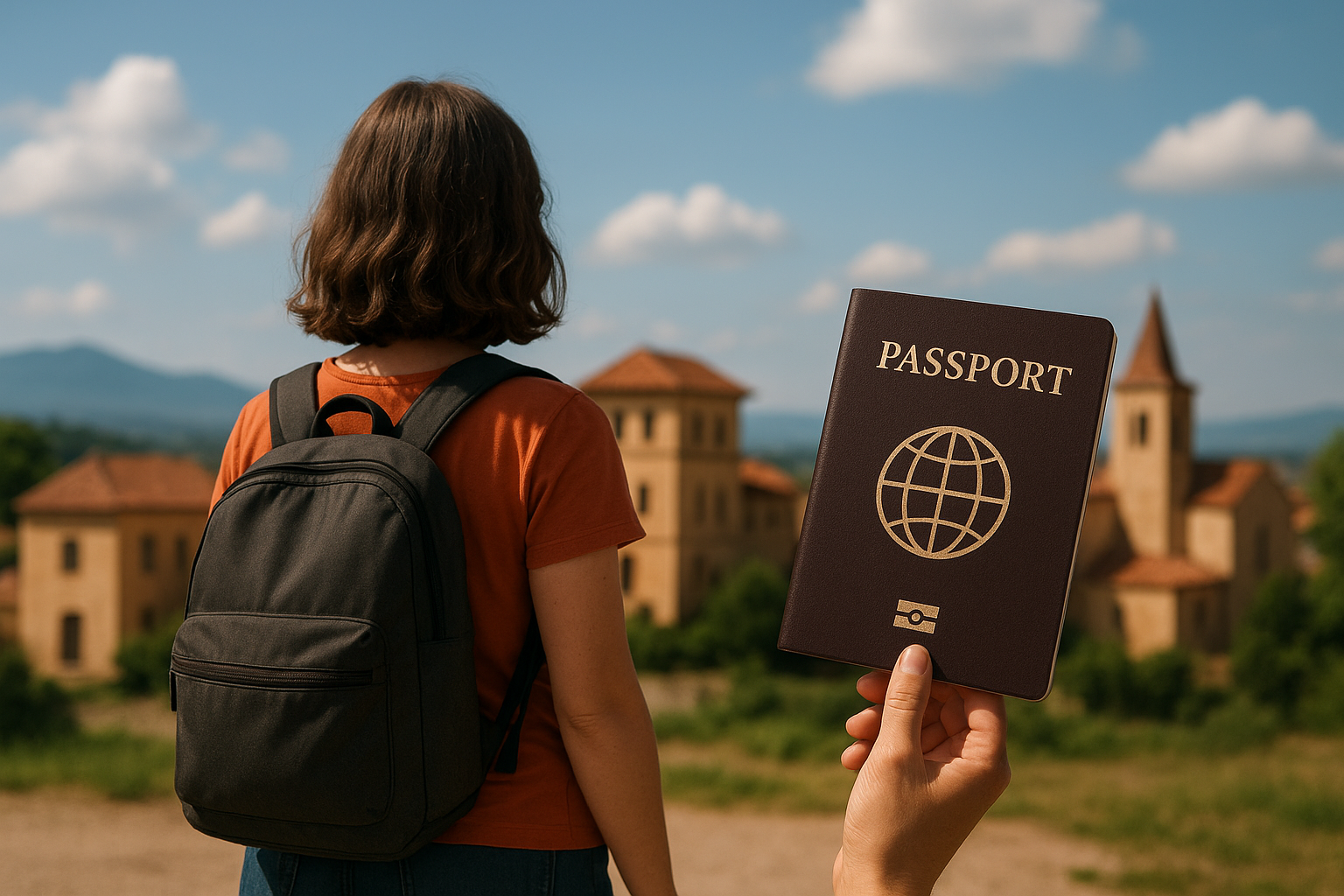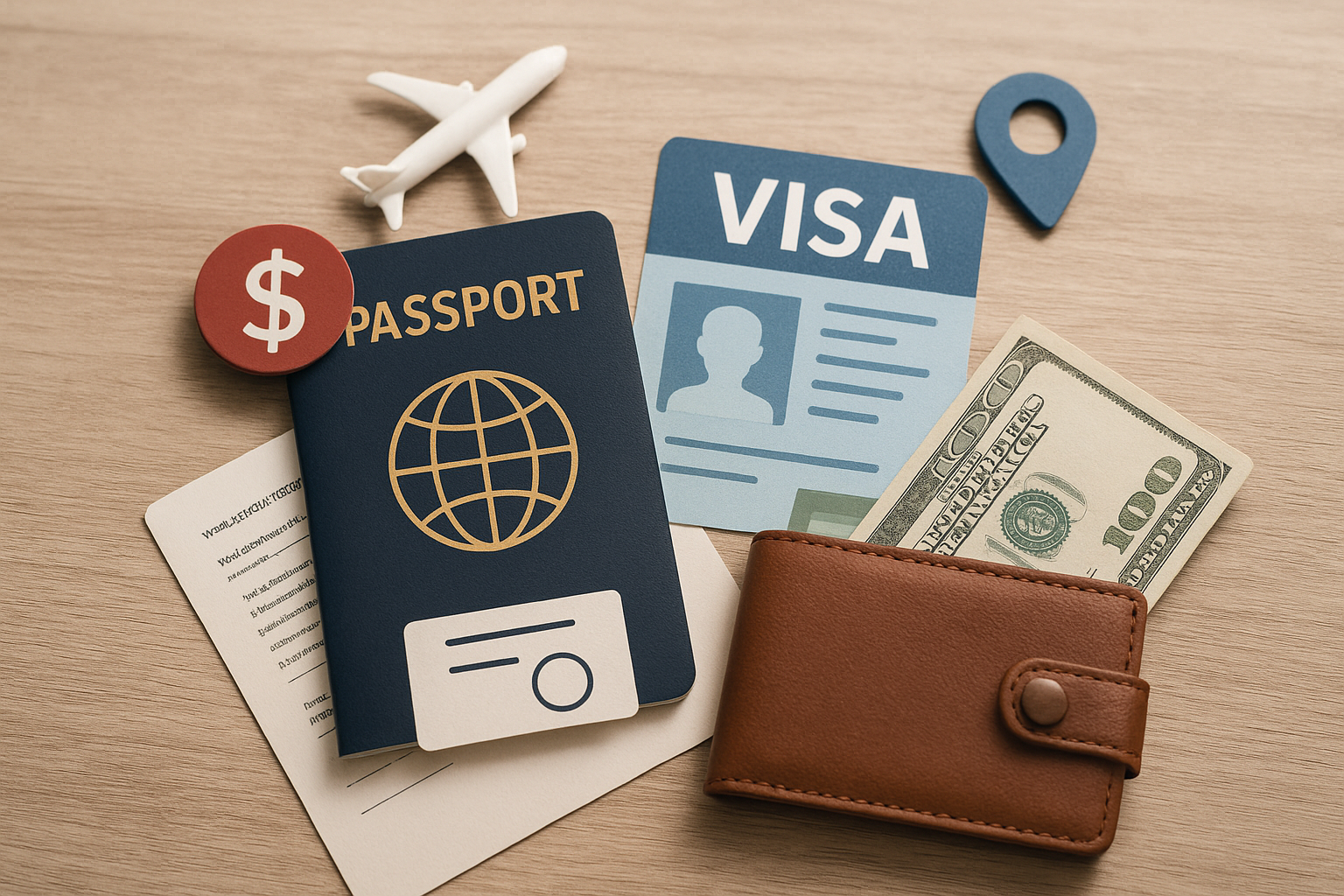From Tourist to Resident: The Complete Guide to Visa Transitions
Have you ever stepped off a plane in a foreign country and felt an immediate sense of belonging? That moment when the local coffee tastes perfect, conversations flow naturally with strangers, and you find yourself saying “I could live here” more seriously than ever before? You’re not alone.
Every year, millions of travelers experience this pull, but most assume their tourist visa is a dead end. The reality is far more encouraging: there are legitimate, accessible pathways to transform your temporary visit into a long-term adventure. Whether you’re a digital nomad seeking your next base or a traveler who’s discovered their perfect corner of the world, transitioning your visa status is not only possible but increasingly streamlined across many countries.
This comprehensive guide breaks down every major pathway, from student visas to investment programs, complete with real costs, timelines, and insider tips that can save you months of confusion.
Decoding the Visa Maze: Your Options Explained
Most tourist visas grant you 30-90 days of exploration, but what happens next depends entirely on which door you choose to open. Each country structures its immigration system differently, yet certain patterns emerge globally.
Student Visas: The Learning Route Perhaps the most accessible transition, student visas often require minimal financial proof compared to other options. In Mexico, for example, enrolling in a Spanish language school can cost as little as $800 per month, while automatically granting you legal residency status. Many programs are specifically designed for foreigners, with built-in support for visa applications.
Countries like South Korea have revolutionized this process through their university partnerships. Seoul National University’s Korean language program not only provides world-class education but also connects students with part-time work opportunities, making the transition financially sustainable.
Work Visas: The Professional Path Securing employment abroad requires strategy, but remote work has created unprecedented opportunities. Estonia’s e-Residency program allows you to establish a European business digitally, then apply for their startup visa with your own company as sponsor. The total cost runs approximately €2,000-3,000, significantly less than traditional investment visas.
Germany’s skilled worker shortage has opened doors in unexpected sectors. Beyond the obvious tech and engineering roles, there’s high demand for English teachers, healthcare workers, and skilled trades. The country’s job search visa allows six months to find employment while legally residing there.
Digital Nomad Visas: The Remote Revolution The pandemic accelerated what was already brewing: countries actively competing for remote workers. Portugal’s D8 visa requires €3,280 monthly income but grants access to the entire EU through its residency pathway. Compare this to Dubai’s virtual working program at $611 for one year, and you can see the range of options available.
Indonesia presents an interesting case study. While not offering an official nomad visa, their B211A visa can be extended multiple times, creating a de facto long-term option for remote workers. The process costs around $500 per extension and can be handled entirely within the country.
Investment and Family Routes Greece’s golden visa program starts at €250,000 for real estate investment, but savvy investors often partner with others to meet requirements. Portugal’s program, while pricier at €500,000, includes the entire family and provides a clear path to citizenship after five years.
Family reunification remains one of the most straightforward paths, though requirements vary dramatically. Spain recognizes de facto partnerships after one year of cohabitation, while other countries require marriage certificates or more extensive documentation.
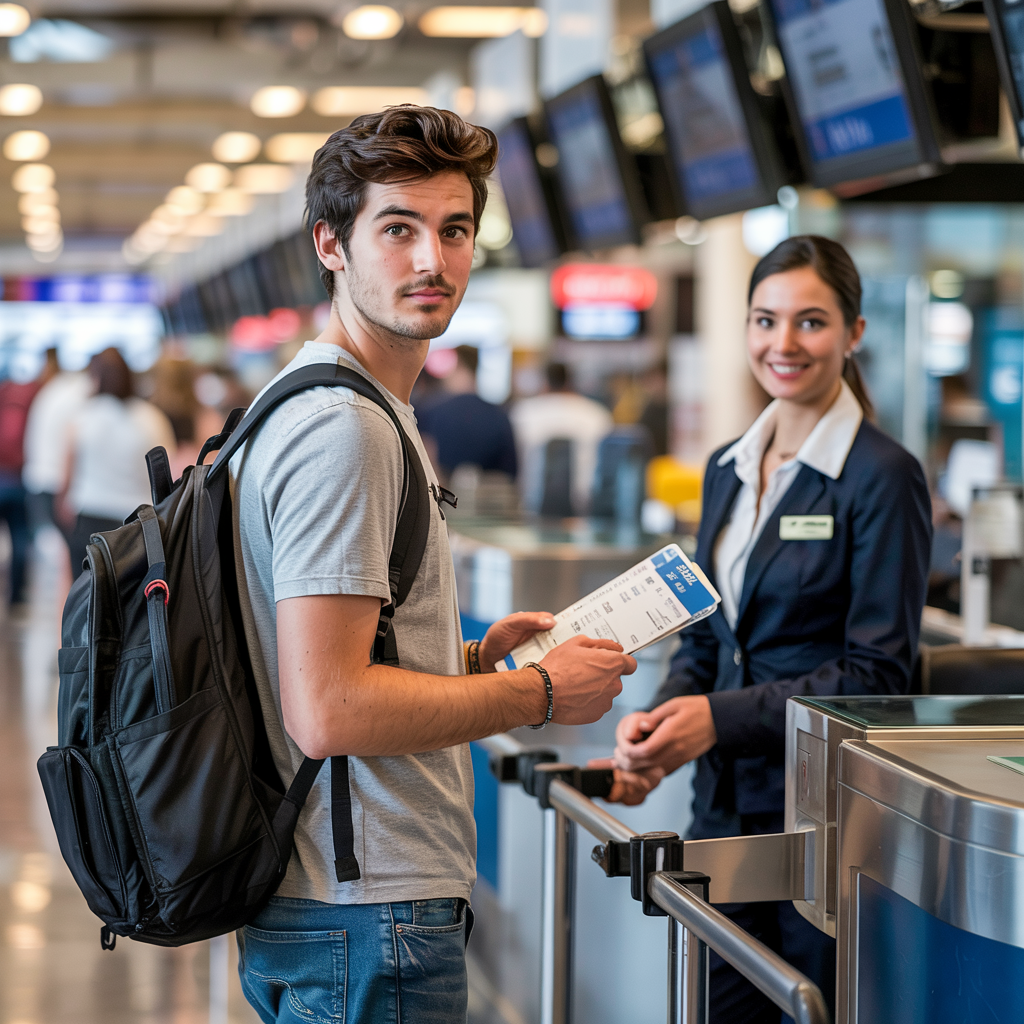
The Student Visa Strategy: More Than Just Classes
Student visas offer unique advantages that many travelers overlook. Beyond legal residency, they often include work permits, healthcare access, and sometimes even tax benefits.
Language Schools: Your Gateway In Spain’s language school visa exemplifies this approach perfectly. Schools like Enforex in Madrid or Don Quijote in Barcelona offer comprehensive packages including visa assistance, housing recommendations, and cultural integration programs. Total costs typically range from €2,000-4,000 per year, including tuition and fees.
The process usually involves:
- Enrollment confirmation from an accredited institution
- Proof of financial support (€6,000-10,000 annually in most European countries)
- Health insurance coverage
- Clean criminal background check
- Housing arrangements or institutional guarantee
University Programs: The Long-term Investment For those seeking deeper integration, university programs offer extended stay options. Germany’s public universities charge minimal fees (€150-350 per semester) even for international students, making it one of Europe’s most affordable study destinations.
Australia’s student visa system allows 40 hours of work per fortnight during studies, making it financially viable for many applicants. Vocational education and training (VET) courses can be as short as six months while still qualifying for visa sponsorship.
Working Your Way to Residency
The employment route requires more preparation but often leads to the most stable long-term outcomes. Success depends on understanding each country’s labor market and visa requirements.
Skills in Demand Tech workers have perhaps the easiest path globally, with countries like Canada, Australia, and Germany actively recruiting through points-based systems. However, opportunities extend far beyond coding. New Zealand’s skilled migrant program includes chefs, electricians, and healthcare workers among its priority occupations.
Teaching English remains viable in many Asian countries, though requirements have become more stringent. China now requires bachelor’s degrees and TEFL certifications, while Thailand’s teacher shortage has created opportunities for qualified educators across all subjects.
Freelancer and Entrepreneur Visas The entrepreneurial route has exploded in popularity as countries recognize the economic benefits of attracting innovative talent. Chile’s Start-Up visa provides one year of residency plus $40,000 in equity-free funding for selected applicants. The application process is entirely online, with decisions typically made within 60 days.
France’s talent passport for entrepreneurs requires demonstrating either €30,000 in funding or support from an approved incubator. The visa grants four years of residency and includes family members, making it attractive for those with longer-term plans.
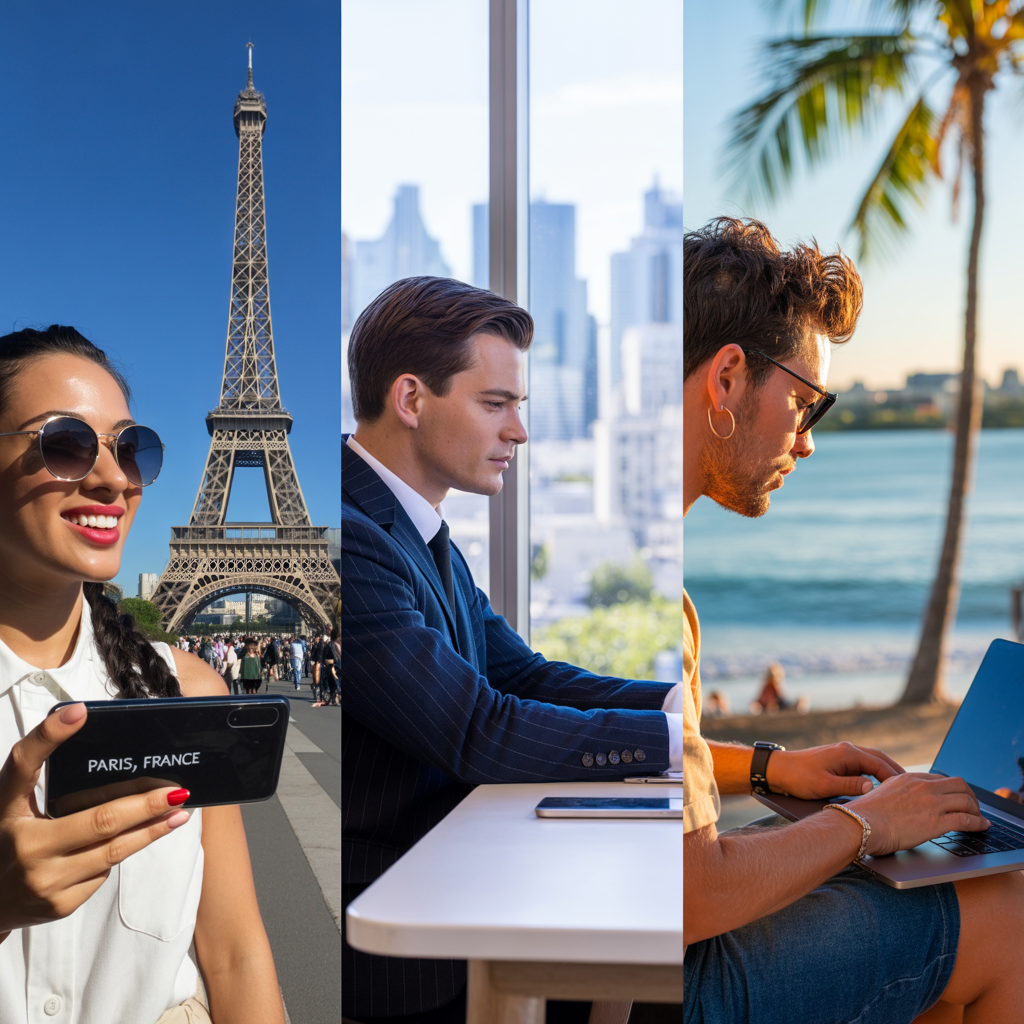
Digital Nomad Visas: The New Frontier
What started as a handful of experimental programs has become a global movement, with over 50 countries now offering some form of remote work visa.
European Options Portugal leads European efforts with multiple pathways for remote workers. The D8 visa requires proof of €3,280 monthly income and grants two-year residency with renewal options. The application process takes 2-3 months and can often be completed from within the country if you’re already there on a tourist visa.
Estonia’s digital nomad visa targets high earners with a €4,500 monthly requirement but offers unique benefits including access to the country’s advanced digital infrastructure and e-residency programs. The visa lasts one year with possible extension.
Tropical Destinations Barbados pioneered the tropical nomad visa concept with its Welcome Stamp program. For $2,000, remote workers can live and work on the island for one year. The program includes family members and has been so successful that neighboring Caribbean nations have launched similar initiatives.
Indonesia’s approach differs significantly. Rather than creating new visa categories, they’ve streamlined existing B211A visas for remote workers. The six-month visa costs around $500 and can be extended multiple times, though each extension requires a brief exit and re-entry.
Tax Considerations Remote work visas often include tax benefits that can substantially reduce your overall costs. Portugal’s Non-Habitual Resident program offers significant tax advantages for new residents, particularly those earning foreign income. Dubai’s visa comes with zero personal income tax, making it attractive despite higher living costs.
Understanding tax obligations requires professional advice, as rules vary based on your home country’s tax treaties. Many nomads work with international tax specialists to optimize their global tax situation legally.
Investment Pathways: Golden Visas Explained
Investment-based residency programs, commonly called golden visas, have become increasingly popular among high-net-worth individuals seeking European residency.
Real Estate Investment Programs Greece’s program requires €250,000 in real estate investment, among the lowest thresholds globally. Properties can be rented out for income, and the visa includes family members. However, physical residency requirements are minimal, making it attractive for those wanting European access without full relocation.
Portugal’s €500,000 threshold is higher but includes more benefits, including healthcare access and a path to citizenship after five years. Recent changes have restricted Lisbon and Porto investments, directing capital to interior regions and creating opportunities in emerging areas.
Business Investment Options Ireland’s Immigrant Investor Programme requires €1 million in approved investments but offers EU access and potential citizenship after five years. Approved investments include enterprise investments, investment funds, and endowments to approved projects.
Singapore’s investor visa starts at S$2.5 million but grants access to one of Asia’s most strategic business hubs. The program includes family members and provides a clear path to permanent residency.
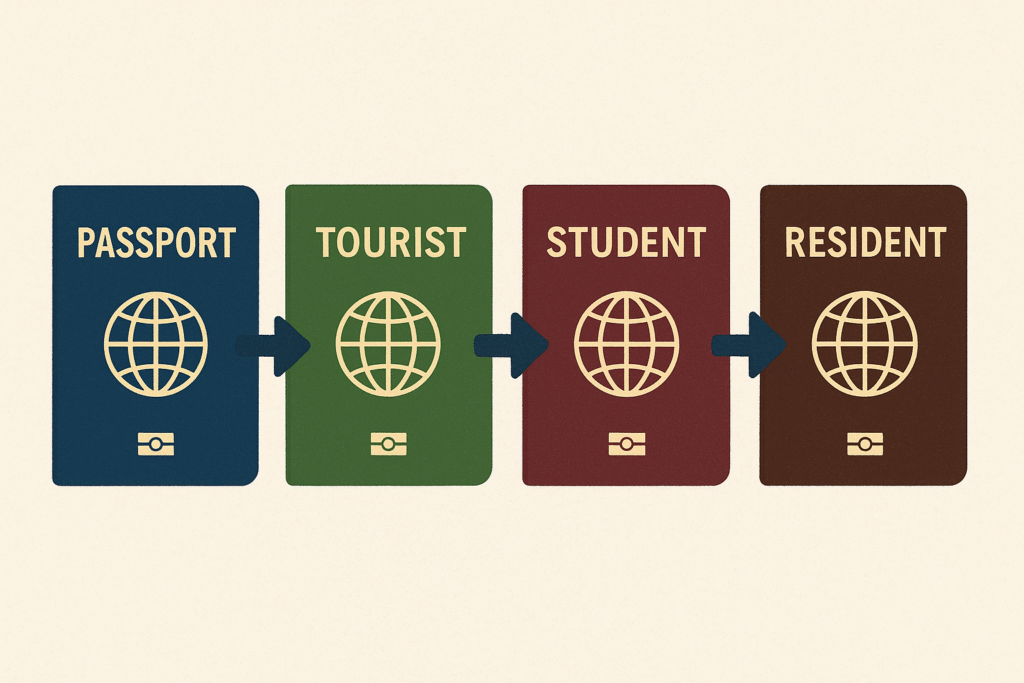
Navigating Common Obstacles
Every visa transition involves potential pitfalls, but understanding common challenges helps you prepare effectively.
Timing Your Application One of the most critical factors is timing your application correctly. Some countries, like Canada, require you to apply from outside the country, while others, such as Spain, allow in-country transitions. Missing this detail can result in expensive delays and additional travel requirements.
Germany’s system exemplifies good planning. Tourist visa holders can apply for student visas within the country, but work visa applications typically require returning home. However, job search visas bridge this gap, allowing six months to secure employment and transition to a work permit.
Documentation Requirements Apostilled documents cause frequent delays, particularly for Americans unfamiliar with the process. An apostille is an international certification that validates your documents for use in foreign countries. Processing times vary by state, from same-day service in some locations to several weeks in others.
Bank statements require particular attention. Most countries specify minimum balances and require statements from specific timeframes. Portugal, for example, requires three months of statements showing consistent income above their threshold. Some countries accept only statements from traditional banks, excluding online-only institutions.
Financial Proof Standards Meeting financial requirements goes beyond having money in your account. Countries often require proof of consistent income rather than lump sum deposits. This distinction matters particularly for freelancers and remote workers whose income may fluctuate monthly.
Mexico’s temporary resident visa requires proving $1,620 monthly income for six months or $27,000 in bank savings. However, they accept various income sources, including rental properties, pensions, and business profits, providing flexibility for different financial situations.
Professional Support: When to Hire Help
Immigration lawyers and consultants can expedite processes and prevent costly mistakes, but their value depends on your situation’s complexity.
DIY vs Professional Assistance Simple transitions, like tourist to student visas in countries with streamlined processes, often don’t require professional help. Spain’s student visa application is straightforward enough for most people to handle independently, with clear online resources and helpful consular staff.
Complex cases benefit significantly from professional guidance. If you have previous immigration violations, criminal history, or unique circumstances, professional representation becomes valuable. Immigration lawyers understand nuances that can make the difference between approval and rejection.
Choosing the Right Professional Not all immigration professionals are equal. Licensed lawyers provide the highest level of service but charge accordingly, typically $150-500 per hour. Immigration consultants often charge less but may have limited ability to represent you in complex situations.
Research credentials carefully. In Australia, only registered migration agents can provide immigration advice for fees. Similarly, Canadian immigration consultants must be members of the College of Immigration and Citizenship Consultants. These regulatory bodies maintain directories of qualified professionals.
Country-Specific Insights
Each destination has unique characteristics that can significantly impact your transition strategy.
European Union Advantages EU residency provides access to 27 countries, making it particularly valuable. Portugal and Spain offer relatively accessible pathways, while Germany provides excellent opportunities for skilled workers. However, Brexit has complicated UK access, requiring separate applications.
Nordic countries (Denmark, Sweden, Norway) offer high quality of life but strict requirements and lengthy processing times. Finland’s startup visa is particularly innovative, offering equity-free funding alongside residency for successful applicants.
Asian Powerhouses Singapore and Hong Kong remain attractive for business professionals, though both have become more selective recently. Japan’s startup visa program is expanding, particularly welcoming tech entrepreneurs and innovative business models.
South Korea’s D-8 visa allows foreigners to start businesses with relatively low capital requirements (approximately $84,000), while providing access to the country’s advanced infrastructure and strategic location.
Emerging Destinations Countries like Malaysia, Thailand, and the Philippines are developing new programs to attract international residents. Malaysia’s My Second Home program recently restructured its requirements but remains attractive for retirees and remote workers.
Thailand’s proposed Long-Term Resident visa aims to attract digital nomads and skilled professionals, though specific requirements are still being finalized. Current programs like the Smart Visa already provide pathways for qualified professionals in target industries.
Financial Planning for Your Transition
Budgeting for visa transitions involves more than application fees. Hidden costs can quickly accumulate, so comprehensive planning prevents surprises.
Direct Costs Application fees vary dramatically by country and visa type. Student visas typically cost $50-300, while investment visas can reach $5,000+ in fees alone. Processing times also affect costs, particularly if you need temporary accommodation while waiting for approval.
Document preparation adds substantial expense. Apostille services cost $15-25 per document in the US, but expedited processing can double these fees. Translation services for non-English documents typically charge $25-50 per page, with certified translations commanding premium rates.
Indirect Expenses Temporary accommodation during application processing can be expensive, particularly in major cities. Consider longer-term rentals or house-sitting arrangements to reduce costs. Some countries require proof of accommodation as part of the application, making advance planning essential.
Health insurance requirements vary significantly. EU countries typically require coverage minimums of €30,000, while other destinations may accept basic travel insurance. Comprehensive international health insurance plans typically cost $1,200-3,600 annually but provide worldwide coverage.
Ongoing Living Costs Research local cost of living carefully, as visa requirements often reflect minimum income needs rather than comfortable living standards. Portugal’s €760 monthly requirement covers basic needs, but comfortable living in Lisbon requires significantly more.
Banking relationships can impact your transition success. Some countries require local bank accounts for visa applications, while others accept foreign accounts. Establishing banking relationships early in your journey can prevent delays later.
Technology Tools for Modern Nomads
Digital tools have revolutionized visa applications and international living, making processes more accessible than ever before.
Application Management Many countries now offer online application systems that streamline the entire process. Canada’s express entry system allows complete applications online, with real-time status updates and document upload capabilities.
Estonia’s e-residency program exemplifies digital innovation, allowing entrepreneurs to establish EU businesses entirely online. The system includes digital signatures, online banking, and remote company management tools.
Document Management Cloud storage becomes essential for managing multiple visa applications and maintaining backup copies of critical documents. Services like Dropbox and Google Drive offer secure storage, but ensure compliance with each country’s data protection requirements.
Mobile scanning apps like CamScanner or Adobe Scan produce high-quality document copies that many consulates accept. This capability becomes invaluable when dealing with unexpected document requests or last-minute applications.
Financial Management International banking apps like Wise (formerly TransferWise) offer multi-currency accounts that satisfy many countries’ banking requirements. These services typically provide better exchange rates and lower fees than traditional banks.
Cryptocurrency adoption varies significantly by country, with some embracing digital currencies while others restrict their use. El Salvador’s bitcoin adoption makes it theoretically possible to demonstrate wealth through cryptocurrency holdings, though practical implementation remains limited.
Building Your Global Network
Success in visa transitions often depends as much on who you know as what you know. Building relationships within expat communities provides invaluable insights and support.
Online Communities Facebook groups for specific countries or visa types offer real-time advice from people navigating similar processes. Groups like “Americans in Portugal” or “Digital Nomads Europe” provide practical insights that official resources often miss.
Reddit communities like r/digitalnomad and country-specific subreddits offer detailed discussions about visa experiences, costs, and practical tips. These platforms often feature AMAs (Ask Me Anything) sessions with successful visa applicants.
Professional Networks LinkedIn has become increasingly valuable for international job searching, particularly in countries offering work visa pathways. Many professionals share their visa journey experiences, creating valuable learning opportunities.
Industry-specific networks can provide targeted opportunities. For example, AngelList connects entrepreneurs with startup visa opportunities, while RemoteOK focuses on companies offering visa sponsorship for remote workers.
Local Connections Language exchange programs, coworking spaces, and expat meetups provide natural networking opportunities. These connections often prove invaluable during your transition, offering everything from housing leads to job referrals.
Cultural integration programs, offered by many countries, provide structured introduction to local customs and practical living information. These programs often connect participants with established expat communities and local mentors.
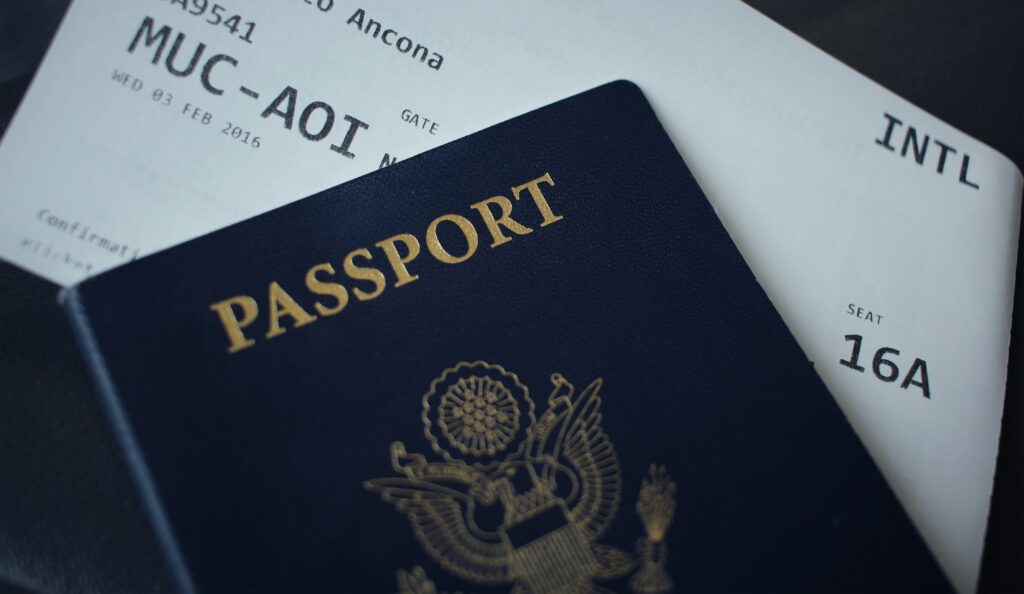
Timing Your Transition Perfectly
Strategic timing can significantly impact your visa transition success, affecting everything from processing times to available opportunities.
Seasonal Considerations Many countries experience application backlogs during peak seasons. European student visas typically face delays during summer months as September intake approaches. Planning applications for off-peak periods can reduce processing times significantly.
Weather patterns affect some decisions. Applying for northern European visas during winter months means arriving during the most challenging season, while tropical destinations may face monsoon or hurricane seasons that complicate relocation.
Economic Cycles Economic conditions influence visa approval rates, particularly for work-based applications. Countries experiencing labor shortages often accelerate processing and reduce requirements, while economic downturns typically result in stricter enforcement.
Exchange rate fluctuations can significantly impact your purchasing power and ability to meet financial requirements. Monitor currency trends when planning your application timing, particularly for investment-based visas.
Personal Readiness Rushing visa applications often leads to mistakes and rejections. Ensure you have adequate time to gather documents, meet requirements, and handle unexpected complications. Most successful applicants begin planning 6-12 months before their intended transition.
Life circumstances also matter. Major life events (marriage, career changes, health issues) can complicate visa applications. Plan transitions during stable periods when you can dedicate necessary attention to the process.
Success Stories and Lessons Learned
Real experiences from successful visa transitions provide valuable insights that official guides often miss.
The Entrepreneur Route Sarah, a marketing consultant from Chicago, transitioned from tourist to entrepreneur in Estonia over six months. Her key insight: start building your business case while still on a tourist visa. She used her initial month to research the market, identify potential clients, and develop relationships with local entrepreneurs.
Her total costs were approximately €3,500, including visa fees, legal consultation, and initial business setup. The most valuable investment was hiring a local accountant who understood both Estonian requirements and US tax implications.
The Student Path Miguel from Mexico City chose Barcelona’s language school route, initially planning one year but ultimately transitioning to a master’s degree program. His advice: choose schools that offer comprehensive support beyond just visa assistance.
His strategy involved enrolling in a basic Spanish course initially, then upgrading to a business Spanish program that better aligned with his career goals. Total costs were €4,200 for the first year, including visa fees and tuition.
The Remote Work Success Lisa, a graphic designer from Toronto, obtained Portugal’s D8 visa after preparing for eight months. Her preparation included building a consistent client base, establishing income documentation, and researching Portuguese tax implications.
Her biggest challenge was proving income consistency as a freelancer. She solved this by working with an accountant to create comprehensive financial documentation that satisfied Portuguese requirements. Her total investment was approximately €2,800, including visa fees, legal consultation, and document preparation.
Future Trends in Global Mobility
Understanding emerging trends helps you make strategic decisions about your visa transition and long-term planning.
Technology Integration Blockchain-based identity verification is beginning to influence visa processing in forward-thinking countries. Estonia’s digital identity system points toward future possibilities where international mobility becomes increasingly frictionless for verified individuals.
AI-powered application processing is reducing human decision-making bias while accelerating approval timelines. Countries implementing these systems often provide more predictable outcomes for applicants meeting clear criteria.
Climate Migration Climate change is beginning to influence visa policies, with some countries developing programs specifically for climate refugees or environmental migrants. While these programs are still emerging, they may provide future pathways for those seeking climate-stable destinations.
Remote Work Evolution The success of digital nomad visas is encouraging countries to develop more sophisticated remote work programs. Future iterations may include tax optimization features, healthcare integration, and simplified business establishment procedures.
Regional Integration Regional visa programs, like the EU’s system, may expand to other areas. ASEAN countries are exploring improved mobility arrangements, while African Union passport initiatives aim to facilitate continental movement.
Making Your Decision
With multiple pathways available, choosing the right approach depends on your specific circumstances, goals, and timeline.
Assessment Framework Consider your primary motivation: career advancement, lifestyle improvement, education, or investment returns. Each pathway serves different objectives, and understanding your priorities helps narrow options effectively.
Evaluate your financial capacity not just for visa requirements but for long-term sustainability. Meeting minimum requirements doesn’t guarantee comfortable living, particularly in expensive destinations like Switzerland or Singapore.
Risk Tolerance Some pathways offer greater certainty but require larger investments or longer timeframes. Investment visas provide predictable outcomes for those with sufficient capital, while work visas depend on employment market conditions but offer career advancement potential.
Consider backup plans for each pathway. Student visas might lead to work opportunities, while entrepreneurial visas could transition to investment-based residency programs.
Timeline Planning Create realistic timelines that account for document preparation, application processing, and potential delays. Most successful transitions take 6-18 months from initial planning to arrival, depending on the pathway chosen.
Build flexibility into your plans. Visa rules change frequently, and global events can impact processing times or requirements. Maintaining multiple options increases your success probability.
Your Journey Begins Now
Transforming your travel dreams into residential reality requires planning, persistence, and patience, but millions of people successfully make this transition every year. Whether you choose the academic route through student visas, the professional path via work permits, the entrepreneurial journey through business visas, or the investment approach through golden visa programs, legitimate pathways exist for nearly every situation and budget.
The key to success lies not in finding the perfect pathway but in choosing the right one for your circumstances and executing it methodically. Start with thorough research, build a realistic timeline, prepare comprehensive documentation, and don’t hesitate to seek professional guidance when the complexity exceeds your comfort level.
Your next chapter awaits in a destination that has already captured your heart. With the information in this guide, you’re equipped to take the first steps toward making that temporary visit a permanent adventure. The world is more accessible than ever before, and your dream of international living is absolutely achievable.
The only question remaining is: which destination will you call home next?
Related Post: Visa Denial
